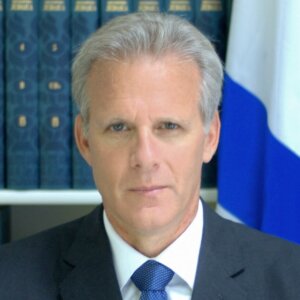Israel’s current crisis is a necessary step in the process of state-making
At 75, Israel is a truly independent state with all the headaches of sovereignty

Graphic by Angelie Zaslavsky
There’s no time that Israeli parents and grandparents hate more than late August. Summer programs have ended, school has yet to begin, and people still have to work. It’s then that the national cry goes up: “What are we to do with the kids?”
The answer for my family and so many others is simple: Water parks.
The nearest one is in Holon, a largely working-class, unobtrusive suburb of South Tel Aviv. There, under a ganglia of fountains, sprouts and geysers, careening down slides that can take an hour to climb and seconds to descend, scream thousands upon thousands of Israelis.
I watched them this past August, while keeping a wary eye on my grandchildren, and marveled. After nearly 50 years of living here, analyzing Israel and commenting on it, on the eve of our 75th birthday, I finally understood us. A mere eight-hour drive from Cairo and Damascus, children of different races, religions and ethnicities splash together in peace.
At least a fifth of all those frolicking in Holon’s waters were African. Not Jewish Ethiopians, but Sudanese, Somalians, Eritreans, and others whose mothers and fathers perhaps immigrated illegally but whose children are Hebrew-speaking Israelis.
Another fifth were Arabs, the women wearing the same halal bathing suits identical from those favored by the Orthodox Jewish women chatting nearby, their children distinguished only by kippot and sidelocks. The remaining three-fifths were average, middle-class Jewish Israelis, mostly secular, all circling family picnic tables overflowing with food.
I looked at this glistening panorama, this festival of music, spray, schnitzel and glee, and thought to myself: This is the Israel that American Jews never see, that they cannot even begin to imagine. This, the Holon water park, is the real Israel.
Still, this idyllic image of Israel cannot disassemble the deep fissures that have opened within Israeli society in recent months, or the fact that Israel is in the throes of determining what sort of state our citizens wish it to be.
The Israel that exists today is very different from the one that I imagined growing up in a Conservative Jewish community in the 1960s. This was the Israel of kibbutzniks wearing their brim-down tembel hats and soiled khakis, improvising a hora after a hard day’s work in the fields. Of Ari Ben-Canaan, Leon Uris’s archetypical Israeli hero played by a godlike Paul Newman in the movie, Exodus. Of paratroopers praying at the Western Wall draped in tallitot of machine gun bullets. This Israel, the good guy, stood up to evil Arab dictators. Young, energetic, virile, brave and not too religious — that was the Israel of my mind.
Upon moving to Israel, though, I swiftly discovered reality. As a researcher for the Joint Distribution Committee, I visited neighborhoods so poor they couldn’t afford indoor plumbing and met Jews from underdeveloped countries who could scarcely write their own names.
In the army, while serving in a unit deliberately integrated with both well-off and socially disadvantaged soldiers, I saw an Israel grappling with worsening drug problems, crime, and discrimination. I fought in morally nebulous wars and patrolled the streets of Hebron and Nablus under watchful, embittered, eyes.
At the same time, though, I saw the emergence of an Israel that outshone even my mind’s most scintillating image. I witnessed the arrival of nearly a million Jews from the former Soviet Union, the airlifting of tens of thousands of Ethiopian Jews, and the relocation of Western Jews in search of — improbably — high-tech jobs and lifestyles.
I saw, and in some cases participated in, the achievement of peace with Egypt, Jordan, and the Abraham Accord countries. I watched as Israel built relations with China, India, Russia and dozens of Asian, African and South American nations, and the establishment of a deep and multi-faceted U.S.-Israel alliance. I saw Israel grow into a global leader in science, conservation, and healthcare, a country with an army more than twice as large as those of France and Great Britain combined.
Simultaneously, another Israel was forming in the minds of many American Jews. This was an Israel happy to receive financial and political support from Conservative and Reform Jews but unwilling to recognize their forms of worship. An Israel increasingly controlled by ultra-Orthodox parties which rejected conversions performed by many American rabbis, even Orthodox ones. An Israel of radical settlers who attacked Palestinian civilians, uprooted their trees and stole their land, and revered the late racist Rabbi Meir Kahane. Replacing the Israel of innovation, creativity, and freedom, was an Israel of intolerance, closed-mindedness and occupation.
The impeccable Israel of the mind of the 1960s, and the far more tarnished image that later clouded it, both contained elements of reality. Israel was a jewel of courage and creativity as well as a dross of radicalism and intolerance. The truth lay in a combination of the two, a hybrid state that was at once incomparable and flawed. And for 75 years, this amalgam survived and even thrived, thanks in part to external enemies that forced it to cohere. But then came peace with several of those enemies, enabling Israelis to look inward and confront our dual identities.
The result has been tumultuous. Hundreds of thousands of Israelis have been demonstrating against their government’s attempts to remove all checks on its power by disempowering the Supreme Court. They are protesting the government’s support for Ultra-Orthodox schools which, by refusing to provide their students with a modern education, are producing generations of Israels who will be unable to sustain the state. The demonstrators are protesting bigoted ministers who, with their hatred, may trigger widespread violence with the Palestinians.
As someone who remembers the anti-war protests of the 1960s, when American flags were burnt and servicepeople spat upon, these demonstrations are, in contrast, outpourings of patriotism, festooned with Israeli flags and accompanied by choruses of “Hatikvah.” Policemen and soldiers are praised.
But what may seem to outsiders as a simple clash between pro and anti-democratic forces in fact barely disguises far more fundamental fissures. There is rich vs. poor, cities vs. the periphery, Ashkenazim vs. Mizrachim, religious vs. secular, left and center vs. right, Arab vs. Jew.
This is Israel, a society that is struggling to define itself. The current crisis is, in fact, a necessary step in the process of Israeli state-making. The fight over the government’s assault on the Supreme Court has succeeded in compelling many to face the contradictions in Israeli society. It has awakened liberal Israel from its long complacency on issues ranging from the failure of ultra-Orthodox schools to the absence of a diplomatic process with the Palestinians. It has focused attention on the urgent need for judicial reform while maintaining limits on the legislature. The success of our next 75 years hinges on our ability to address these issues and to bridge the schisms threatening to tear us apart.
At 75, Israel is still in the process of becoming. A state in which millions of people go to work or school each day, raise families, and root for their favorite football teams. A nation that is healthy, high-functioning, and beloved by so many of its citizens, where the radios play Passover music and their DJs speak in the language of our prophets. This, perhaps, is our greatest accomplishment: creating a truly independent state with all the headaches of sovereignty.
This is the Israel of the Holon water park, a site that American Jews should visit, preferably in August. This is the real Israel — complex, controversial, and miraculous — a country with real challenges with which we, after two millennia of statelessness, are privileged to wrestle.
To contact the author, email [email protected].

















